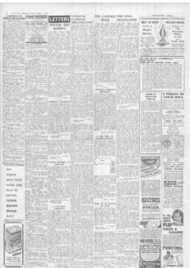Page 4, 8th March 1946
Page 4

Report an error
Noticed an error on this page?If you've noticed an error in this article please click here to report it.
Tags
Share
Related articles
Greybeard's Prayer
They All Said 'yes' To The Small Owners
We All Need A Touch Of Chesterton’s Sanity
Hilaire Belloc
All-round Artist
I Catholic Profiles: 431
REGINALD JEBB
A MAN who knew Reginald Jebb only casually would find it difficult to describe him with the accuracy of a detective. " He is tall and thin, has a good-hearted smile and likes a long-stemmed pipe," he might gay. Hazarding a guess as to vocaticin he niight call him an Array mail or a schoolmaster, n writer perhaps or one of those who are tautologically called gentlemen-farmers.
Actually any one of these identifications would fit him fairly well. He is an Army man in the sense that he served in the 1914-18 war, winning the MC. and taking part in the heroic, ill-starred expedition to -Gallipoli. He is also a schoolmaster of mature experience, although teaching is no longer his profession. His talent for writing has brought hint to Fleet Street as Editor of the Weekly Review. Farming? Well I do not know with what skill and experience he could manage a farm, but [-do know that he is particularly well-itiformed on all matters affecting the revival of agriculture in Great Britain,
REGINALD Jebb
was received into the Church in 1928, six years after his mateinge to the elder daughter of Hilaire &floe. His schooling had been at Shrewsbury, King's College. Cambridge, and Grenoble; and after demobilisation he had become a schoolmaster at Hawkesyard, where he founded St. Louis Preparatory School. The fruits of his experience may be found in his book, The Preparatory School, which was published in 1930. But teaching and occasional writing did not claim the whole of his attention. He was close enough to the country to know something about country life. and he was in constant touch with people who saw clearly that a civilisation divorced Wean the land, and rather contemptuous of agrieulture, was
civiltsation in advanced decay. After his reception into the Church, therefore, he took a keen interest in the Catholic land movement, becoming secretary and treasurer of the Federadon of Catholic Land Associations.
Some day the history of that interesting movement will be seen in correct perspective. It came into prominence during the darkest period of agriculture in English history. The blessings in tragedy of the 1914-18 war had included an increase tp the acreage of cultivated land to the highest figure reached since statistics began to be kept. But within ten years of the Armistice, cultivation had reached its nadir again. Even More dangerous was the propaganda of progressivists, not only in the Press, but on public platfqrms also, and in the schools, who preached the inevitability of an industrial state, dependent on imports for food. Anyone who expressed a cotsmiry view was medieval, reactionary. Yet only a few years were to pass before " Deg for Victory" was the slogan on the postmarks.
The Catholic Land Associations were divided then, but they did a lot of good . work. And in their discussions Jebb played a very useful part, because he sought balance in argument and patience in exposition.. Several types of mind and temperament are needed to give effect to an unpopular. but vital campaign. Jebb's approach to all problems was quiet and practical, which is what' one nerds most in a secretary and a treasurer.
His knowledge of the movement and of use dthtoe golaonddeffects effect in articles f o r G.K.'s. Weekly and for the Catholic Press. But his direct interest in journalism tame later. In 1936, after the death of G. K. Chesterton, it was decided to continue the work uonf deGr.Kihe Wed'ietkolryship of Hilaire Belloe. FM/owing the change of title to the Weekly . Review. Jebh was appointed Assistant Editor. and succeeded to the editorship shortly before the outbreak of War. • THE effect of his work since then has been shown mainly in the leading articles and in the editorial notes, which indicate, if not his hand, at least his guiding hand. He takes news as he finds it and relates it (mmediately to the principles that ought to govern actions. He has two important gifts: a lucid, euphonious style and a talent for marshaling his facts in good order. A retentive memory helps him to relate one point to another, arid with it goes a determination, both of Courage and discretion, to write what needs saying however unpopular it may ht.
fri the course of the war the Weekly Review provoked disagreement even among its friends. It was outspoken when ,sonte of its friends felt obliged to be silent. But, although on occasion, the policy may have been unwise, it could always be defended because it was patiently sincere and based upon the verities.
For that reason the Weekly Review and its Editor will be remembered gratefully for the consistent sense of principle with which comment was
(Cont)nued on page 5)
blog comments powered by Disqus







